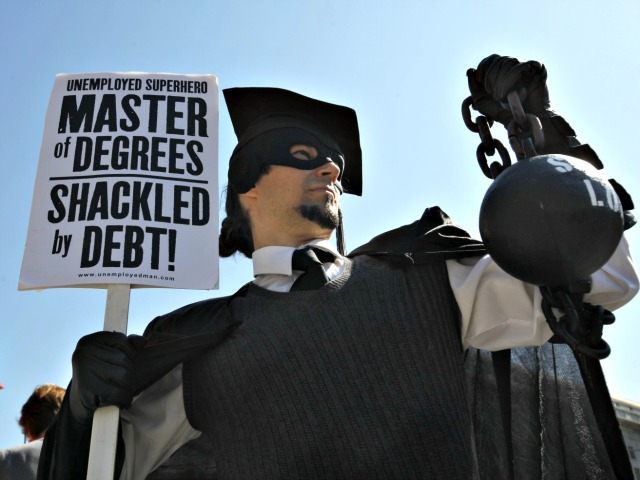Over the weekend, the NY Times published an opinion piece by writer Lee Siegel titled “Why I Defaulted on My Student Loans.” The piece goes beyond the descriptive promised in the headline to the prescriptive when Siegel suggests people “groaning under the weight of student loans” should follow his example.
According to Siegel, defaulting on his student loans was, “the only way I could survive without wasting my life in a job that had nothing to do with my particular usefulness to society.” As Jordan Weissmann at Slate notes, Siegel ultimately earned three degrees–one B.A. and two M.A.s–from Columbia University, one of the most expensive schools in the nation (the #1 most expensive at present). In a paragraph dripping in self-pity, Siegel says it was that or a life of drudgery selling shoes:
Maybe I should have stayed at a store called The Wild Pair, where I once had a nice stable job selling shoes after dropping out of the state college because I thought I deserved better, and naïvely tried to turn myself into a professional reader and writer on my own, without a college degree. I’d probably be district manager by now.
Siegel does say in passing that he might have gone into a lucrative field like finance, but the result would have been, “self-disgust and lifelong unhappiness, destroying a precious young life.” It doesn’t seem to occur to precious Siegel that he may be looking at things backwards. Granted he might not have felt fulfilled as, say, a money manager or a bond trader, but the fact that those jobs generate an income sufficient to pay off students loans (even at Columbia) is prima facie evidence that they are quite useful to society, more useful even than NY Times culture critics. This isn’t really about what is useful to society at all, it’s about the career Siegel was willing to accept from society regardless of how useful others considered it to be.
And it turns out asking society to cover the debt he incurred as he sought said job is just another sacrifice Siegel thinks society should be willing to make. As for “character” and meeting one’s own obligations, Siegel waives that off saying, “I have found, after some decades on this earth, that the road to character is often paved with family money and family connections, not to mention 14 percent effective tax rates on seven-figure incomes.”
Relatively few Americans are born with “family money,” and the number paying capital gains taxes on seven-figure incomes is a fraction of the top one percent. And yet the default rate on student loans is under 14 percent nationwide, and the default rate at Columbia is under 3 percent. In other words, 86% of people nationwide and 97% of Columbia grads manage to show the kind of character Siegel seems to despise.
Siegel concludes his piece by suggesting the country might be better off if more people followed his example:
There would be a national shaming of colleges and universities for charging soaring tuition rates that are reaching lunatic levels. The rapacity of American colleges and universities is turning social mobility, the keystone of American freedom, into a commodified farce.
If people groaning under the weight of student loans simply said, “Enough,” then all the pieties about debt that have become absorbed into all the pieties about higher education might be brought into alignment with reality. Instead of guaranteeing loans, the government would have to guarantee a college education.
Given that students currently owe about $1.2 trillion in loans, and that the country is already over $18 trillion in debt, teaching the next generation that they are not responsible for their own debts seems like the very worst possible lesson.

COMMENTS
Please let us know if you're having issues with commenting.